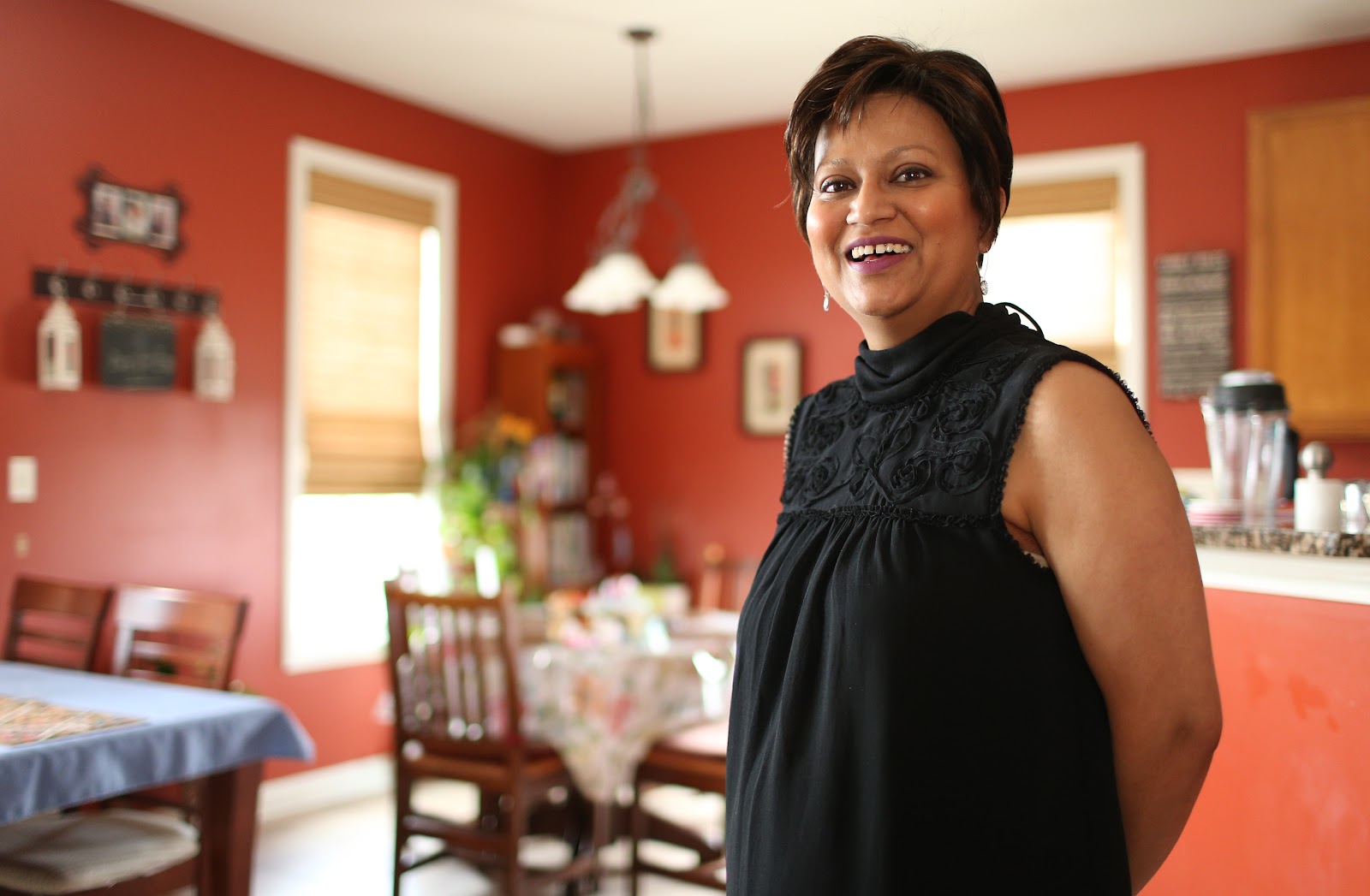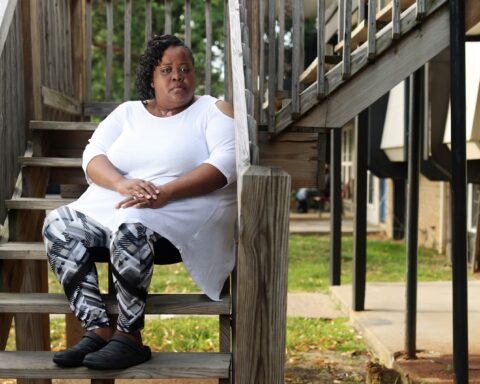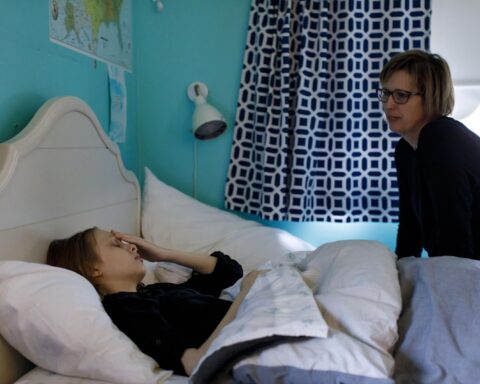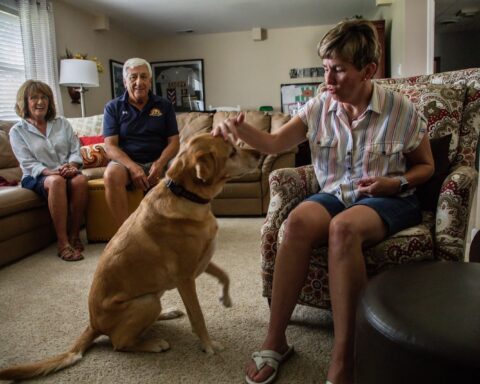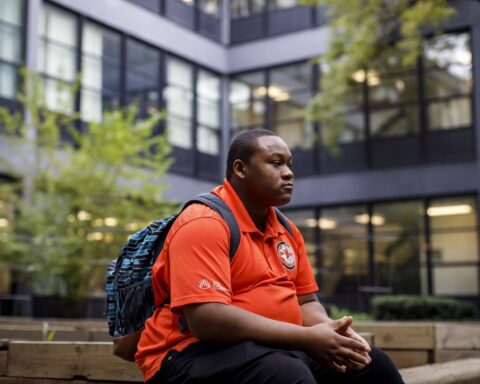There are a number of things that start with the letter C that you don’t mind getting seconds of — cookies, chocolate, coffee refills, a windfall of cash.
But there is at least one c-word that, if you have to encounter it, you hope for a more “one and done” scenario: cancer.
What happens if cancer has found its way to you again and again. How does that affect one’s lifestyle?
Taylor Goettner, a native of Pennsylvania, was 16 when she was first diagnosed with ovarian cancer. Since then, the 24-year-old has faced four recurrences of cancer — each in a different part of her body. First she had an 11.4-inch mass removed from her abdomen, then a stem-cell transplant and then surgeries to remove more body parts.
The eldest of three, she recalled the depression and anxiety that followed her recurrences during a storytelling event The Moth held in the Chicago area in June, “Our Way Forward: Stories That Illuminate the Ovarian Cancer Experience.” In front of an audience, she relayed how her cancer affected her family financially and emotionally.
“It was difficult the first few recurrences. Really hopeless,” she said. During her battle, her family bakery closed, she lost her car. “I had no career, no money, no hope. … I lost everything.”
Uzma Yunus, a psychiatrist and mother of two from Glenview, was diagnosed the first time in July 2013, after she discovered swelling in her armpit. No lump was detected, but she noticed a change in the texture of her breast. A mammogram and ultrasound did not catch the cancer, but a breast MRI did find a 2.8-inch tumor. A mastectomy and induced menopause followed. It was during the screening of her right breast that her liver metastasis was diagnosed.
“I was feeling well … making physical recovery, but then they found those liver spots around April 2016, Yunus said. “I stayed on a treatment that kept those liver spots in check until earlier this year, when I developed a swelling on my skull. There was a lesion on my skull. … They took a big piece out, and this time they found cancer in my spine.”
The 45-year-old, with an interest in women’s mental health, has practiced psychiatry for the last 20 years and said she’s “literally using all the psychiatry” she’s learned in those years to get through her journey.
“Once somebody has had cancer, I don’t believe it’s ever really over — because either people are actually having a recurrence or they’re living in the fear of recurrence,” Yunus said. “Yes, the treatment is over, but they’re dealing with the aftermath and the treatments that they get. … Those lead to long-term complications too.”
Some of the aftermath, she said, is physical — the possibility of getting lymphedema, swelling in one of your arms or legs, or side effects to other organs from chemotherapy drugs. And then there is breast reconstruction that, according to Yunus, requires a minimum of two surgeries — many patients have more to fix size or graft issues.
Then, there’s the emotional aspect of cancer: Some people have symptoms of post-traumatic stress disorder with breast cancer, she said.
“If somebody is a war veteran and they have PTSD, you don’t send them back to war, right? Or for a woman who has been raped, she’s going to avoid that alley, that dark place, men, being alone — the triggers. But for a cancer survivor, you go back to the same environment every time. You go back to that same clinic; you go back to that same lab technician that draws your blood, so we cannot avoid those triggers. Those triggers are consistently there in our lives. So some of it is why it’s very hard to get past it,” she said.
Jessica Safran, a writer, visual artist and mother of a seventh-grade daughter, is on her fifth recurrence. The native New Yorker noted at The Moth event that she’s had cancer for half of her daughter’s life.
“It’s something that’s hard to be around,” she said after the event. “Sometimes it’s really hard to be positive, especially when you’re recurrent. I’m so envious of the people who are one and done. And I’m so grateful for them. But I would have planned this storyline differently. When I got my first recurrence, I said, ‘Whoever are my writers, they’re fired.’ The story has taken the wrong turn; fire all the writers. Not happy.”
Navigating the physical and emotional challenges of recurring cancer brings a variety of challenges, but individuals and companies like Fordcares.com (with its Warriors in Pink program) and Tesaro, a Boston-based oncology-focused biopharmaceutical firm, are offering support and resources in their respective communities for those living with cancer and their loved ones. Both agencies conducted surveys to understand the gaps that exist in the lives of the diagnosed in hopes of filling some of those voids.
Tesaro’s event with The Moth was its first attempt to get patients to connect with one another and the community of ovarian cancer survivors, Kristin Ainsworth, vice president of marketing, said. Fordcares.com is now shifting from an awareness campaign to one of action. According to a recent breast cancer survey, only 28 percent of people know how to help someone newly diagnosed with cancer. Fordcares.com is trying to close that gap with its “More Good Days” program that provides tips, tools and resources to aid patients and their loved ones.
The program works with service providers like Green Chef to supply patients and survivors with customizable, organic meals delivered to their door. Other resources include:
Free recovery garments post-mastectomy surgery from A Little Easier Recovery,
An online platform called Meal Train that organizes supporters to provide meal deliveries, errands services, child care and rides to loved ones in treatment,
Free access to meditation app Headspace, which features meditations specifically designed for cancer survivors, and
Free access to Wanderlust TV’s 21-day yoga challenge videos that feature moves and poses safe for breast cancer patients, who can participate in the comfort of their home
“Another piece of our “More Good Days” is not just these services, but also events and experiences for patients and survivors — to give them that new lease on life and a new type of experience,” Fordcares.com Warriors in Pink brand manager Tracy Magee said. Recent experiences in the Chicago area have included paddleboarding, aerial meditation, a healthy cooking class, an improv theater comedy workshop and dancing lessons.
“I think the hardest part was having to tell my kids that I have cancer again, after we just went through this and we thought everything was going to be OK,” said ovarian/breast cancer survivor Sharon Hart-Braun. “Once you have cancer, you know it’s a real thing — and that’s something you have to deal with,” the Park Ridge resident said. She recalled that when she was going through chemotherapy, she became so anemic that walking from one room to the other made her breathless.
Safran said the ache of her cancer isn’t physical — it’s the pain of anticipating premature separation from her family.
“It’s not a battle with the cancer — frankly it’s a battle with the health care system, and it’s a battle with the side effects, and it’s a battle with my own psyche. But the cancer is already there, and it’s just a matter of dealing with it,” Safran said.
In talking about her disease, she said she looked like a ghost after chemo. Without her energy, she became unrecognizable to herself. Without the ignorance of her own demise, she became separated from everyone she knew. She recalled that was tolerable until she thought about her daughter. Her daughter needed consistency, but Safran needed change. So she started compulsively taking pictures of herself with her iPhone to know that she was still here. She said it was when she was taking photos that she could get perspective, looking at herself at arm’s length and noting, “I am not my cancer.”
That process led to The Identity Shift Project, an online space that “brings new perspectives to healing through artistic collaboration with people experiencing significant life change.” The site features photos of people going through major shifts in life — one being cancer — to convey who these people are now and who they’re becoming. Cancer Shift is a series of portraits of people who have or have had cancer and no longer exclusively identify with their disease.
Hart-Braun’s way of dealing with her recurrence is helping other people through Warriors in Pink, serving as a mentor and doing a lot of small things for individuals directly.
“Every little thing helps — a friend sent me some cookies — every little thing like that, that people do, just makes you feel good because somebody cares, you’re not alone,” said the former USDA food inspector. She said she often makes care bags for treatment centers, with cancer items and information in them. It’s been five years since her breast cancer, and now the 68-year-old retiree is focused on trying to find hair stylists to donate time to cut and style wigs for those undergoing treatment.
“You’re never out of the woods, but I don’t dwell on it either. It’s important to continue with your normal life as much as you can. I’ll admit, if I have an ache or pain or something, that’s the first thing that pops into my mind. But I don’t lay awake at night worrying about it. Now, it’s more important than ever to live my life.”
Yunus agrees.
“I can’t stop living life through treatments. Yeah, my body has cancer, but the rest of my body is healthy, so why should I let go of that? Yes, of course there is this thread that follows me, a shadow that follows me every day — this is my reality, but I focus on the here and now and what I have and what I can do,” she said.
Since her recurrences, Yunus has shuttered her traditional practice and taken her “healing out of the office” via a blog called “Left Boob Gone Rogue” (which she’s turning into a cancer memoir). Coupled with her advocacy work with Warriors in Pink, she offers her skills of counseling and therapy online by reassuring patients and survivors that there can be normalcy after a diagnosis. She also shares her recurrence experience with other medical professionals to enlighten those treating patients about the anxiety patients feel and what she, a doctor on the other side of the disease, has found deficient in cancer care. She says a lot of her blogging has been about sharing her experience, so people know, how does a doctor approach this?”
“Being a physician, some of what I saw in medicine is that we put patients physically together, but we do a terrible job of putting them back together psychologically. …
“You’re told one day, ‘Your treatment is over, now go back and live your life. And the pieces of your broken life are all here, go put it together.’ And that’s very, very hard, which is one of the reasons the social media groups are so popular, why the survivor sisterhood is so strong. When you go to these breast cancer walks, there’s this bond among women, and that is partly because that woman can tell me things my doctor never can.
“When I was open with my story, survivors just started to come to me, and I’ll always answer their questions. .”
She considers writing her form of therapy now; exercise and building relationships with others through communication have helped in her journey, as well.
“Talking has been my work, so how can I be quiet about this? I talk about it, and I share, and that has been healing,” she said. “As hard as it is, as much suffering that I’ve gone through, I just accept that this is my fate, but at the same time, just use my time as best as I can. That’s my purpose.”
